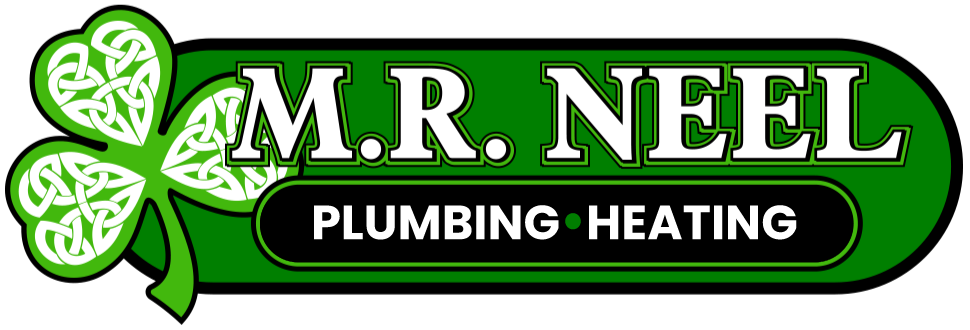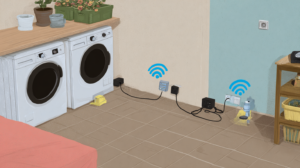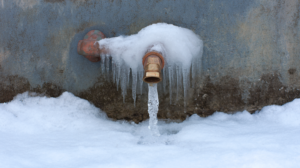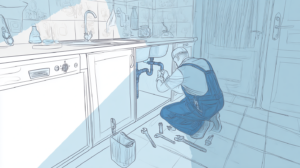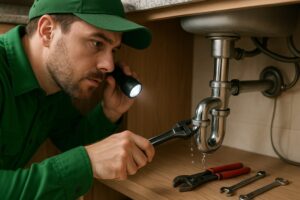A clogged drain is more than just a minor inconvenience. Left untreated, it can lead to leaks, water damage, and even larger plumbing issues down the line. While it might be tempting to tackle clogs yourself to save time and money, there are safe and effective methods to consider—as well as some common mistakes to avoid. For those facing recurring clogs or needing a more robust solution, M.R. Neel Plumbing offers a full range of residential and commercial plumbing services designed to handle any scale of problem.
Here is a detailed guide to the do’s and don’ts of clearing drain clogs in your home.
Do These 4 Things When Clearing a Clogged Drain Yourself
1. Use a Plunger
Using a plunger is often the simplest way to clear a clog. It creates a vacuum that dislodges blockages in sinks, toilets, and showers by forcing water through the drain. However, the key to effectiveness lies in the technique.
Why This Works: The vacuum created by a plunger helps to dislodge debris stuck in the drain without the need for harsh chemicals or invasive tools. This method works well for clogs caused by materials like food particles, small objects, and hair. Always ensure that the plunger is the right size for the drain to achieve a tight seal.
Tips:
- Use short, quick plunges while maintaining the seal.
- For a sink, cover the overflow drain to maximize suction.
- Avoid excessive plunging, as too much force can damage the pipes if done incorrectly.
2. Use a Drain Snake (Auger)
For clogs deeper within the pipes, a drain snake is one of the best tools you can use. This tool consists of a flexible, coiled wire designed to reach further into the drain and catch clogs.
Why This Works: The snake’s rotating mechanism allows it to latch onto blockages like hair or solid objects that are too deep to be reached by a plunger. Because it physically removes the clog rather than pushing it further down, it’s highly effective for more challenging clogs.
Tips:
- Insert the snake slowly to avoid pushing the blockage further down.
- Rotate it as you push to “hook” onto the debris.
- If you feel resistance, pull back slightly, rotate again, and slowly pull the clog out.
3. Try Natural Solutions Like Baking Soda and Vinegar
This combination can help dissolve minor clogs caused by soap scum, grease, and organic matter. Pour about half a cup of baking soda, followed by half a cup of vinegar, down the drain. Let it sit for 15-20 minutes, then flush with hot water.
Why This Works: The fizzy reaction from mixing baking soda and vinegar helps to break down soft clogs without damaging the pipes. It’s also an environmentally friendly method compared to chemical drain cleaners.
Tips:
- Avoid using boiling water, especially for PVC pipes, as extreme heat can soften or damage plastic pipes.
- Repeat the process if the clog isn’t fully cleared the first time, but don’t overdo it, as too much vinegar could erode some metal components over time.
4. Conduct Regular Maintenance
Preventing clogs in the first place is always easier than dealing with them. Regularly cleaning your drains and being mindful of what you dispose of can prevent most common clogs.
Why This Works: Simple measures, like using strainers to catch hair and food debris or not pouring grease down the sink, prevent large debris from entering the pipes. Regular maintenance ensures your drains stay clean and clear, saving you time and effort in the long run.
Tips:
- Flush kitchen and bathroom drains with hot water weekly.
- Use drain strainers or mesh covers to catch hair and particles.
- Pour a little baking soda followed by hot water monthly to keep drains fresh and clear.
Do NOT do These 4 Things When Clearing a Clogged Drain Yourself
1. Avoid Chemical Drain Cleaners
Chemical drain cleaners may seem convenient, but they can do more harm than good. These products often contain harsh chemicals like sulfuric acid or lye that may harm your plumbing.
Why This Is a Problem: Over time, these chemicals can erode pipes, especially if used repeatedly. This is particularly true for older metal pipes, which may be more susceptible to corrosion. Additionally, chemical cleaners can be harmful to the environment and may cause skin and eye irritation.
Safer Alternative: Stick to natural solutions like baking soda and vinegar, or consider contacting a professional if the clog is stubborn.
2. Don’t Force Plumbing Fixtures
Many people resort to pushing or banging pipes and fixtures when they encounter a clog. However, applying too much force can easily break components or loosen connections, leading to more severe issues.
Why This Is a Problem: Plumbing fixtures are often more delicate than they appear. Excessive force can damage threads, seals, or connectors, which may lead to leaks or require expensive replacements.
What to Do Instead: If a clog doesn’t respond to gentle pressure, it may be time to call in a professional plumber. Forcing it could make the situation worse.
3. Avoid Using Makeshift Tools
It can be tempting to improvise with household items to clear a clog, but this often leads to accidental damage. Items like wire hangers or metal rods can scratch or puncture pipes.
Why This Is a Problem: Unintended damage from makeshift tools can compromise the integrity of your plumbing. Metal objects may scratch pipe linings or damage PVC pipes, potentially leading to leaks.
Safer Alternative: Invest in a simple drain snake or auger, as these tools are designed specifically for clogs. If the clog persists, a professional plumber will have the tools and skills to handle it safely.
4. Don’t Ignore Recurring Clogs
If a drain consistently backs up, there’s likely an underlying issue within your plumbing system. Recurring clogs may indicate a deeper blockage in the main sewer line, a problem that requires professional attention.
Why This Is a Problem: Ignoring a recurring clog can lead to severe blockages that could affect multiple drains or cause sewage backups. Additionally, attempting to treat the symptom without addressing the root cause could waste time and money.
What to Do Instead: A licensed plumber can inspect your system, determine the cause of the recurring clogs, and offer a long-term solution.
When to Call a Professional Plumber
DIY methods are useful for minor, occasional clogs, but some cases require the expertise of a licensed plumber. M.R. Neel Plumbing, serving Camden County, NJ, specializes in reliable plumbing solutions that address both surface-level and deeper issues in your home’s plumbing system. They offer a range of services, including:
- Drain Cleaning Services: Using professional tools and techniques, their team can thoroughly clear clogs and ensure your plumbing flows smoothly.
- Repairs for Persistent Issues: Whether it’s a broken pipe or an ongoing blockage, M.R. Neel Plumbing handles repairs efficiently to prevent further damage.
- Preventative Maintenance: The team also provides maintenance services to keep your plumbing system in excellent shape, which can help prevent clogs from happening in the first place.
The licensed and experienced team at M.R. Neel Plumbing & Heating ensures your plumbing system is well-maintained and that minor clogs don’t turn into major issues. Contact M.R. Neel Plumbing for assistance with stubborn or recurring clogs and let the experts keep your drains flowing freely.
In Summary
While it’s possible to tackle minor drain clogs on your own, knowing when to stop and call in a professional plumber is crucial. M.R. Neel Plumbing offers the tools and expertise needed to address more challenging clogs without risking damage to your pipes. By following these do’s and don’ts, you can keep your plumbing in top condition and avoid many common plumbing mishaps.
